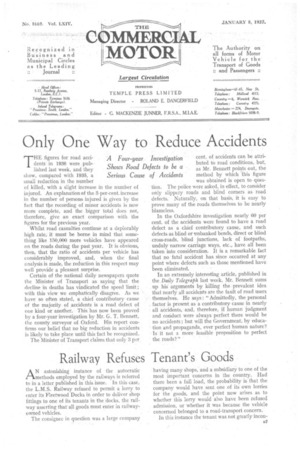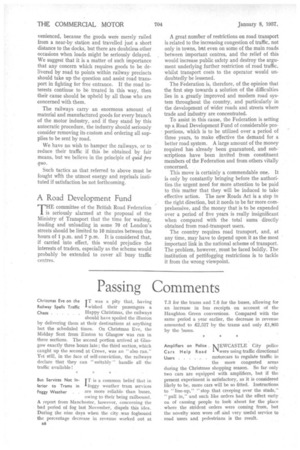Railway Refuses Tenant's Goods
Page 21

Page 22

If you've noticed an error in this article please click here to report it so we can fix it.
AN astonishing instance of the autocratic methods employed by the railways is referred to in a letter published in this issue. In this case, the L.M.S. Railway refused to permit a lorry to enter its Fleetwood Docks in order to deliver shop fittings to one of its tenants in the docks, the railway asserting that all goods must enter in railwayowned vehicles.
The consignee in question was a large company having many shops, and a subsidiary to one of the most important concerns in the country. Had there been a full load, the probability is that the company would have sent one of its own lorries for the goods, and the point now arises as to whether this lorry would also have been refused admission, or whether it was because the vehicle concerned belonged to a road-transport concern.
In this instance the tenant was not greatly incon venienced, because the goods were merely railed from a near-by station and travelled just a short distance to the docks, but there are doubtless other occasions when loads might be seriously delayed. We suggest that it is a matter of such importance that any concern which requires goods to be delivered by road to points within railway precincts should take up the question and assist road transport in fighting for free entrance. If the road interests continue to be treated in this way, then their cause should be upheld by all those who are concerned with them.
The railways carry an enormous amount of material and manufactured goods for every branch of the motor industry, and if they stand by this autocratic procedure, the industry should seriously consider removing its custom and ordering all supplies to be sent by road.
We have no wish to hamper the railways, or to reduce their traffic if this be obtained by fair means, but we believe in the principle of quid pro quo.
Such tactics as that referred to above must be fought wIth the utmost energy and reprisals instituted if satisfaction be not forthcoming.
A Road Development Fund
THE committee of the British Road Federation is seriously alarmed at the proposal of the Ministry of Transport that the time for waiting, loading and unloading in some 70 of London's streets should be limited to 10 minutes between the hours of 1 p.m. and 7 p.m. It is considered that, if carried into effect, this would prejudice the interests of traders, especially as the scheme would probably be extended to cover all busy traffic centres. A great number of restrictions on road transport is related to the increasing congestion of traffic, not only in towns, btt even an some of the main roads between important centres, and the relief of this would increase public safety and destroy the argument underlying further restriction of road traffic, whilst transport costs to the operator would undoubtedly be lessened.
The Federation is, therefore, of the opinion that the first step towards a solution of the difficulties lies in a greatly improved and modern road system throughout the country, and particularly in the development of wider roads and streets where trade and industry are concentrated.
To assist in this cause, the Federation is setting up a Road Development Fund of considerable proportions, which is to be utilized over a period of three years, to make effective the demand for a better road system. A large amount of the money required has already been guaranteed, and subscriptions have been invited from constituent members of the Federation and from others vitally concerned.
This move is certainly a commendable one. It is only by constantly bringing before the authorities the urgent need for more attention to be paid to this matter that they will be induced to take effective action. The new Roads Act is a step in the right direction, but it needs to be far more comprehensive, and the money that is to be expended over a period of five years is really insignificant when compared with the total sums directly obtained from road-transport users.
The country requires road transport, and, at any time, may have to depend upon it as the most important link in the national scheme of transport. The problem, however, must be faced boldly. The institution of pettifogging restrictions is to tackle it from the wrong viewpoint.




























































































